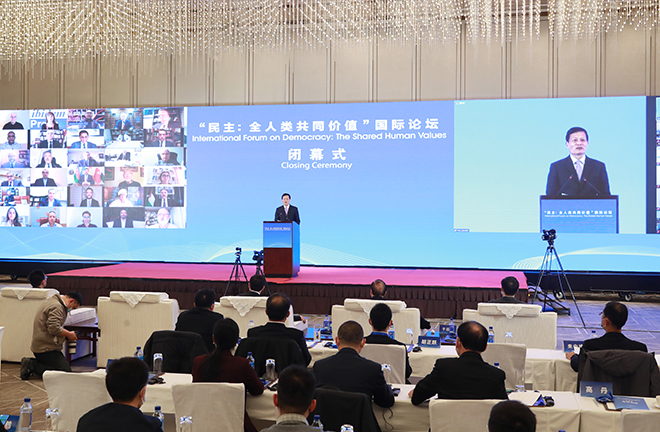International Forum on Democracy concludes

The Closing Ceremony of the International Forum on Democracy: The Shared Human Values in Beijing on Dec. 15 Photo: Zhu Gaolei/CSST
The International Forum on Democracy: The Shared Human Values concluded in Beijing on Dec. 15, after global experts exchanged ideas on the topic of diversity in democracy.
No single path to democracy
Democracy is rooted in the historical traditions of each country; it is the result of the practical exploration and wisdom of their people, with diverse realization forms, said Xie Fuzhan, president of the Chinese Academy of Social Sciences (CASS), in his speech at the forum’s Closing Ceremony.
Each country’s people have the right to choose their own development path and institutional model, Xie continued, observing that blindly believing in a “universal” model and copying other countries’ practices will not only make it difficult to establish and develop effective democratic politics, but also will bring about various problems and crises.
“Using a single yardstick to measure the world’s rich and diverse political systems is a violation of political laws: such a practice itself is undemocratic,” Xie said.
Over the past 100 years, the CPC has led the Chinese people to make unremitting explorations and struggles, achieving the running of the country by the Chinese people, who account for nearly one-fifth of the world’s population. This in itself is an important contribution to the cause of human democracy, Xie said. China’s democratic achievements are independent creations that do not rely on colonial plunder, enslavement of, or wars of aggression against any other nation. They have declared the failure of the “end of history” with facts, disrupting the “theory of the singleness and universalism of Western-style democracy.”
Du Zhanyuan, president of China International Communications Group, noted that it has never been easy to achieve democracy and there are no ready models to copy from.
“Countries must explore their own paths by drawing on the shared wisdom of Eastern and Western civilizations,” he said.
In this age of unprecedented change, the world faces increasing instability and uncertainties on a turbulent journey to democracy, equality, fairness, and justice, Du said.
“Without a concerted effort from all countries, there is a risk of regression in democracy in global governance, and the true value of democracy will be corroded by populism and hegemonism,” Du noted, according to the Xinhua News Agency.
CASS Vice President Wang Linggui pointed out that the forum has formed a basic understanding and overall view of democracy, and believes that it is necessary to establish a new concept of democracy, uphold diversity in democracy, and establish a new concept of democratic evaluation. Resolutely opposing tearing apart the world in the name of democracy, experts at the forum have affirmed China’s contributions to the new ecology of world political civilization.
Wang continued, noting that the forum has demonstrated an unremitting pursuit of democratic values and expressed admiration and appreciation for the concept of “the whole-process people’s democracy” put forward by President Xi Jinping.
“There is no ultimate model for democracy, no one-size-fits-all democratic experience. The pursuit and exploration of democracy must also be constant,” Wang asserted.
Global Think Tank Network
At its Closing Ceremony, the forum launched the “Global Think Tank Network for Democracy Studies,” consisting of 12 Chinese think tanks and 30 think tanks from other countries.
The forum also launched the Beijing Initiative: A Global Think Tank Network of Democracy Studies. The initiative calls for upholding and safeguarding democracy as a shared human value and respecting the diversity of civilizations and democracy.
The initiative also suggests evaluating democracy by measuring public satisfaction and voiced strong opposition to confrontation and division in the name of democracy, according to the Xinhua News Agency.
The forum, which opened on Dec. 4, took place in three phases. Over 500 experts from 120 countries and regions, as well as 20 international and regional organizations, participated in the forum either in-person or virtually.
Edited by JIANG HONG
